Welcome to Light On Light Through, Episode 173, in which "Captain" Phil Merkel interviews me about Joe Biden's speech to Congress last night, and how likely it is that Republicans in Congress will enact Biden's proposals into laws. We also discuss the police killing of innocent African-Americans and other current events, including Michael Collins' (RIP) contribution to getting humans out into space. MaryBeth Rikouski joins us in the discussion.
reviewing 3 Body Problem; American Rust; Bosch: Legacy; Citadel; Curb Your Enthusiasm; Fauda; For All Mankind; Foundation; Hijack; House of the Dragon; Luther; Outer Range; Outlander; Reacher; Severance; Silo; Slow Horses; Star Trek: Strange New Worlds; Surface; The: Ark, Diplomat, Last of Us, Lazarus Project, Orville, Way Home; Tokyo Vice; True Detective; You +books, films, music, podcasts, politics
George Santayana had irrational faith in reason - I have irrational faith in TV.
Thursday, April 29, 2021
Tuesday, April 27, 2021
Big Sky 1.13: Ronald Back in Action

The victim was Mary, sister of Ronald's girlfriend Scarlett. So it's close to Ronald killing his sister-in-law to be, which is what might happen if Ronald were really the good boy he's always telling the mother he murdered and keeps inside his head he really is. (How's that for a tortured sentence). But speaking of which, he certainly verbally tortures Mary before he kills her with his patented insane commentary.
The killing is also notable because Cassie and Lindor pull up right after Ronald has done the deed. Somehow, he manages to escape. How does he do that? If Ronald is nothing else, he's one resourceful psycho. And he apparently has not only escaped, but took Mary's body, or hid it somewhere. If that's in the house, Cassie and Lindor don't find it.
What they do find, though, is another body. Whose? It's been there a while, so it's very likely Ronald didn't do that killing. (I say "very likely" because we still don't know exactly when Ronald and Scarlett first met.) But if not Ronald, who? At this point, likely either Mary or Scarlett.
So this was a very good episode. A new killing from Ronald, and a dead body Ronald apparently wasn't responsible for. Which means, a killer revived, and a likely new killer's work revealed. And just for good measure, things are getting even more abrasive in that abrasively dysfunctional Kleinsasser family.
And I'll be back here with a report next week in how at least a little of that turns out.
See also Big Sky 1.1: A Pretty Big Deal ... Big Sky 1.2: The "Goods" and the Ruined Plan ... Big Sky 1.3: "You Kidnapped the Wrong Girl" ... Big Sky 1.4: Controls on Psychos ... Big Sky 1.5: Winter Finale Indeed! ... Big Sky 1.6: "Sweet Psycho" ... Big Sky 1.7: The Montana State Trooper ... Big Sky 1.9: Crafty Ronald ... Big Sky 1.10-11: Rocky Mountain High, Somewhat Twisted ... Big Sky 1.12: Sheriff Before Butterscotch
Truth Be Told: An Excellent Telling
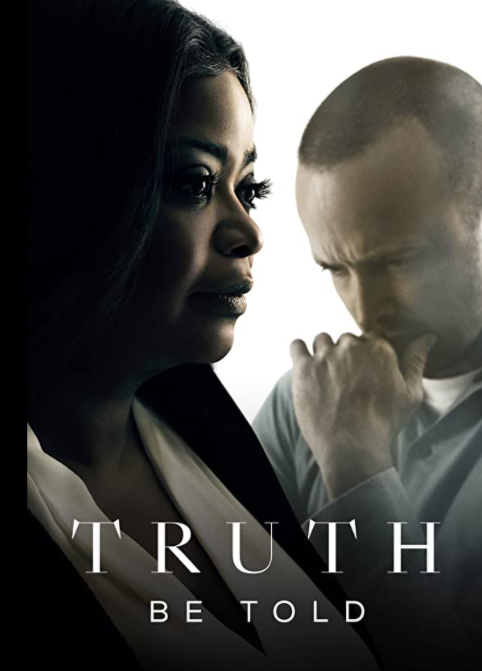
I saw Truth Be Told on Apple TV+ over the past few nights. It received a lukewarm response from critics but was much enjoyed by the general public. I'm with the general public on this one, not the myopic critics, what else is new. I'm really glad it was renewed for a second season, which should be up sometime this year.
The eight-episode mini-series rings a bell on a bunch of levels:
- It's a first-class whodunnit, with at least a handful of plausible suspects, and a resolution which is both surprising, yet makes good sense in retrospect, or just want you want in this kind of murder mystery.
- Poppy is a reporter now podcaster, who revisits in her podcast a murder she reported on in The New York Times twenty years ago. Truth Be Told offers a compelling tableau of the relationship of traditional and newer media, in particular the pressures that a podcaster faces. This series is not the first to have a podcaster at the center of the narrative, but it's one of the best.
- Poppy is African-American, and Truth Be Told provides a well-furnished view of Black culture in America, ranging from family life to life in prison.
- The acting is really good. Octavia Spencer is just right as Poppy, combining head and heart, and struggling to keep her marriage sound as she devotes increasing time to finding the killer. Aaron Paul is great as the guy behind bars, whom Poppy is trying to exonerate and free -- I'd say this is his best performance since Breaking Bad (yeah, he was more effective in Truth Be Told than in Westworld). Lizzy Caplan is impressive as the Buhrman twins, convincingly portraying two different yet intersecting personalities. And the other characters were well played. Always good to see Mekhi Phifer (former detective helping Poppy) and Michael Beach (Poppy' husband) on the screen.
Monday, April 26, 2021
Debris 1.9: Resets 1
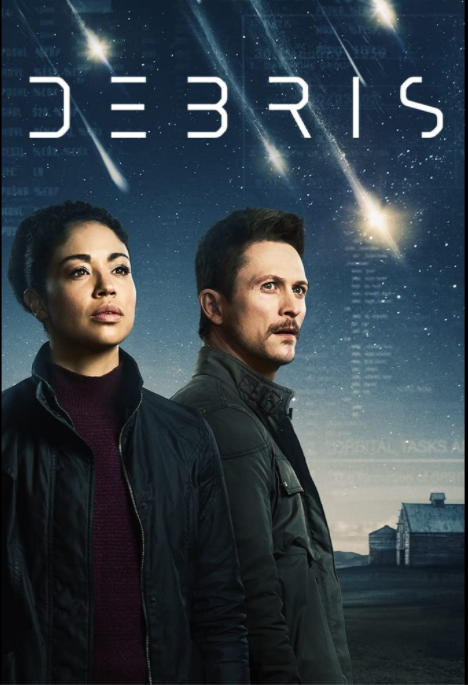
The hour starts off conventionally enough (that is, conventionally enough for Debris). A diver comes into contact with a piece of Debris off the coast, and finds he's in an alternate reality minus his sister. And the narrative stays conventional enough (that is, for Debris) throughout most of the rest of the hour. Bryan and Finola investigate what's going on, now with the help of Finola's sage father. But the diver, desperate to find his sister, keeps jumping in the ocean and swimming towards the Debris to enter yet another new reality. We see everything from the diver's perspective, including Bryan having different partners in some of the realities. Finola's father says colors are important in understanding what's going on, especially the color orange. In an especially nice touch, it even looks like one of the Bryans has orange reddish hair. (Did they dye Jonathan Tucker's hair, or just changed the lightning, or maybe my mind was playing tricks on me.)
But all of that is just prelude to what happens near the end. Bryan tries to stop the diver from swimming towards the Debris -- the repeated resets of reality could "damage the universe" -- and Bryan gets sucked into an alternate reality himself, where, among other things, Finola is not his partner.
And this turns out to be just Part 1 of a two-part story about alternate-reality resets. I've seen some good alternate-reality episodes on various science fiction series over the years -- those on Star Trek: TOS and Star Trek: TNG are especially memorable -- but this episode of Debris is something new, very different, and right up there with the best.
See you back here next week in what I hope is our same reality with my review of the conclusion of this story (or these stories).
See also Debris 1.1 Some Probability of Gems Among the Pieces ... Debris 1.2: Clones ... Debris 1.3: Trapped Out of Time ... Debris 1.4: Suspentia Belief ... Debris 1.5: Fine Tuning ... Debris 1.6: Fountain of Youth and Its Complications ... Debris 1.7: Ferry Cross the Moebius Strip ... Debris 1.8: Resurrection and Its Hazards
The Nevers 1.3: Mary's Melody
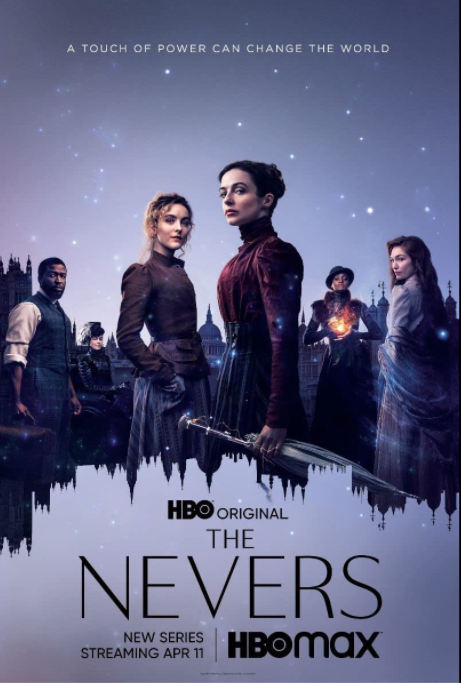
A really powerful, touching, terribly beautiful and instructive episode 1.3 of The Nevers on HBO tonight.
I was thinking, as Mary was singing in the park tonight, her voice amplified by some kind of Edison-like loudspeaker with possibly some dollop of superpower worked in, that if only the Touched can hear Mary sing, and we in the audience, on the other side of the screen, can hear her, than maybe The Nevers is telling us that all of us are touched in some way, too.
It was a lovely thought, until bullets tore it apart. And there's a trenchant lesson in there for us, too. In tonight's episode, the monster with the eaten-away and maybe also electronic head is easily disposed of. And Amalia, after a pretty fierce battle in the water with the big bald chain-wielding guy manages to put him of out his homicidal misery, too. But not so the horrible bullets that end Mary and her song.
Isn't that a lot like our own 21st-century real time, when bullets are daily doing so much horrendous damage, fired both by police and civilians with hate in their hearts, and we seem to be unable to stop it? Mundi is able to stop this assassin, but there will be more, just like there are in our own world.
Dr. Cousens has incredible healing powers, which we saw again tonight, but he can't bring back the dead, at least as far as know. That's a line which no one who has crossed can come back from, not here or in the special, wondrous Victorian world in the which The Nevers takes place.
But we still have Mary's song, and I like to believe that, where there's song, there's hope, and maybe in our world as well as theirs.
See also The Nevers 1.1: Never Say Never ... The Nevers 1.2: Song and Gun



"challenging fun" -- Entertainment Weekly
Friday, April 23, 2021
Podcast Review of For All Mankind, Season 2
Welcome to Light On Light Through, Episode 172, in which I review For All Mankind (Episodes 2.2-29) on Apple TV+.
Blog post reviews of these episodes:
For All Mankind 2.2: The Peanut Butter Sandwich ... For All Mankind 2.3: "Guns to the Moon" ... For All Mankind 2.4: Close to Reality ... For All Mankind 2.5: Johnny and the Wrath of Kahn ... For All Mankind 2.6: Couplings ... For All Mankind 2.7: Alternate History Surges ... For All Mankind 2.8: Really Lost in Translation ... For All Mankind 2.9: Relationships ... For All Mankind 2.10: Definitely Not The End
Red Moon (2000) by David S. Michaels and Daniel Brenton
The Missing Orientation -- why we've made so little progress on and beyond the Moon in our reality
The Loose Ends Saga -- another alternate space travel history

=========================
anthology

For All Mankind season 2 Finale: Definitely Not the End
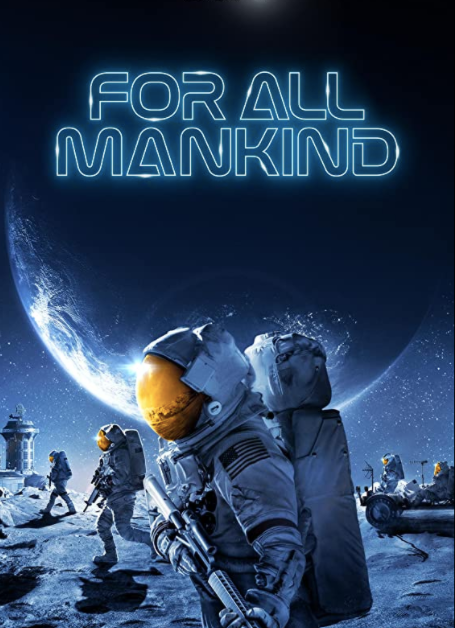
Well, the season 2 finale of For All Mankind, just up on Apple TV+, was about as good as it gets. Which is about as good as any science fiction space travel alternate history story can get. Which, by my lights, is grand indeed.
Apropos space travel, the final covered all the bases [spoilers follow ...]
The US and USSR in this one hour attacked each other on the Moon, with loss life on both sides, and made peace in space with a defiant Apollo-Soyez docking, and on Earth, where this docking inspired the war-prone Reagan to reach his hand out in peace to Andropov (in the alt-history news clip of their meeting, though, it sure looked like it was Reagan and Gorbachev meeting, as they did in our reality, but ok).
Two highlights of the near-war on the Moon and on Earth were Ed firing on and obliterating The Sea Dragon -- great name for a spaceship, now sacrificed for peace -- and just how that came to happen on Pathfinder. The action on Jamestown the U. S. Moonbase was also nail biting and heart in mouth. I would much rather have seen Gordo and Tracy survive, of course, but their not surviving, losing their lives by just a minute or two, maybe an hour after they reclaimed love, was more realistic and emotionally profound.
I also very much liked Kelly quoting John Lennon -- "Everything will be ok in the end. And if it’s not okay, it’s not the end" -- to get her bearings in her turbulent life. This doesn't come from a John Lennon song that we know. It's not even certain that the quote comes from Lennon -- he might well have heard it from the Maharishi. But maybe in the alternate reality that is For All Mankind, John Lennon really was the first to say this. He wasn't assassinated in that reality, and the world of the early 1980s therefore has had a few precious more years to know him and his work, and that's more than fine with me. I think Lennon's assassination was one of the most grievous of the 20th century, and I sent my time travel Jeff Harris back to save him in my novel, The Loose Ends Saga (I won't tell you if he succeeded).
I will tell you that I loved the very ending of this second season of For All Mankind, we humans on Mars in 1995. That’s what might have happened, had the Soviets beaten us to the Moon in 1969. That's what we'll see next season. I hope we see it by the end of this decade in our reality. In the meantime, I'll watch the third and every ensuing season of For All Mankind, and be back here with reviews.
See also For All Mankind, Season 1 and Episode 2.1: Alternate Space Race Reality ... For All Mankind 2.2: The Peanut Butter Sandwich ... For All Mankind 2.3: "Guns to the Moon" ... For All Mankind 2.4: Close to Reality ... For All Mankind 2.5: Johnny and the Wrath of Kahn ... For All Mankind 2.6: Couplings ... For All Mankind 2.7: Alternate History Surges ... For All Mankind 2.8: Really Lost in Translation ... For All Mankind 2.9: Relationships
*** Note added 27 October 2023: Check out my review of Jack Dann's new book, The Fiction Writer's Guide to Alternate History
Thursday, April 22, 2021
The Nevers 1.2: Song and Gun

Just chiming in here to say what I liked most and least in this past Sunday's excellent episode 1.2 of The Nevers on HBO.
What I liked most: The focus on the power or "turn" of Mary, who is a singer whose voice can bring together all who are touched. I really liked this, because, if you think about, music in our untouched world has its own power to bring people together, in concerts, protests, all kinds of spiritual gatherings, which should soon be resuming as we get vaccinated and beyond this Covid age. Music is a magic that is available on both sides of the television. I also think Eleanor Tomlinson is just right in the role of Mary -- she was perfect as Demelza in the reboot of Poldark.
What I liked least: Amalia shooting herself, as a strategy, and accidentally hitting a "vital" organ. There are all kinds of things wrong with that. First of all, I think shooting yourself anywhere is a dangerous strategy. But it makes no sense that Amalia, even in that very hectic situation, would accidentally shoot herself in a vital organ. Dr. Cousens helpfully informs everyone, including us, that Amalia will have a full recovery. But we still don't know what vital organ was hit, and whether there will be some residual consequences, despite what Cousins said.
Anyway, most of the other interludes and developments moved the narrative along in helpful ways. We now know more of the implacable villainy of Lord Massen. I'm looking forward to the irrepressible Hugo standing up to him even more. Augustus walking away from Penance was disappointing and I'd say crazy, but I'm sure we'll see them back together.
And I'll be back here next week with another review.
See also The Nevers 1.1: Never Say Never



"challenging fun" -- Entertainment Weekly
Big Sky 1.12: Sheriff Before Butterscotch

Well, that was my favorite scene in last night's Big Sky 1.12, when U. S. Marshall Lindor chooses the sheriff before the offered butterscotch candy, and therein springs Cassie from the sheriff's keeping. I haven't had a butterscotch candy in years, but if I remember corrected they were delicious, making Lindor's sacrifice to liberate Cassie really significant. I expect the two of them will be together before the end of the season. He did take the butterscotch on the way out.
Meanwhile, Ronald still looking like a demented John Denver continues like a time bomb. He gives an indecipherable smile to the the camera when his new girlfriend says she loves him. But she's got some crazy in her too, so there's no telling what will happen when that bomb blows up. It's a good bet she won't go easily or quietly, if she goes at all.
And then there's that supremely miscreant family, "bad news," as Rosie aptly says. Most of the scenes with them are more nauseating than frightening. Their connection to the first half of the season is at this point still unclear, and until and if it does, you have to wonder why the narrative is devoting so much time to these misfits.
I'll hazard a guess. In addition to connections which will no doubt be revealed, the Kleinsassers serve as an aesthetic counterweight to the sheer natural beauty of Big Sky country. It's like, for some reason, the creators of this series weren't satisfied with just kidnapping and killing to balance the breathtaking nature all around. You know what? I liked that balance just fine. I'd certainly take butterscotch over what old Horst deservedly, unknowingly, drank in his coffee.
See also Big Sky 1.1: A Pretty Big Deal ... Big Sky 1.2: The "Goods" and the Ruined Plan ... Big Sky 1.3: "You Kidnapped the Wrong Girl" ... Big Sky 1.4: Controls on Psychos ... Big Sky 1.5: Winter Finale Indeed! ... Big Sky 1.6: "Sweet Psycho" ... Big Sky 1.7: The Montana State Trooper ... Big Sky 1.9: Crafty Ronald ... Big Sky 1.10-11: Rocky Mountain High, Somewhat Twisted
Tuesday, April 20, 2021
Chauvin Guilty on All Three Counts: Thoughts on How this Happened
Today will be recorded in history as a great day for Black Live Matter and American jurisprudence: former police officer Derek Chauvin was found guilty on all three counts. Chauvin is now a justly convicted murderer.
This is the beginning of a profound correction in the American judicial system, which for decades and centuries has exonerated police who took the lives of innocent black men with impunity. What was different in this case?
It's because the killing of George Floyd by Derek Chauvin was not only captured on video -- that has happened many times before, with police acquitted, as happened with Rodney King in the 1990s -- but because the murder of George Floyd was conducted in slow, agonizing motion. Sometimes a killing by an officer with a gun happens so quickly that it's difficult to see on a shaky video. Not so so the video recorded by the 17-year-old Darnella Frazier that all of us, including the jury, have seen of Chauvin taking the life out of Floyd with his knee on Floyd's neck. They and we saw the horror of murder in slow motion.
This verdict is the end of this trial, but not the end of the process of holding murderous cops to account, and, even more important, getting them not to kill innocent human beings in the first place. This will require much better hiring and much better training of those who want to wear the badge.
It's good that we now have a President in office who wholeheartedly supports this verdict. I have confidence that Biden and the Democrats in both Houses of Congress will keep applying maximum pressure to move this profound remaking of the police forward in this country.
Monday, April 19, 2021
Debris 1.8: Resurrection and Its Hazards

Well, Debris finally cashed in tonight -- ok, this was only the 8th episode, so maybe "finally" is a bit harsh, but it's seemed like a long time -- on the promise (or threat) of Finola's deceased father George being resurrected or reanimated is the more au currant word.
Now, you know if that happened, that George wouldn't. couldn't, possibly be exactly the same. First, there's what I years ago called "the paradox of duplication" -- you can never make a perfect or complete copy of a unique entity, such as any human being, because that duplication will unavoidably rob the original of a crucial characteristic, its uniqueness (see my Mind at Large: Knowing in the Technological Age, 1988, pp. 149-150; and/or my review of Charles Platt's Silicon Man). And worse than that, as was explored so well in Frank Herbert's Dune Messiah, chances are the people or beings who brought a departed loved one back to life will endow that reanimated entity with something not to your liking.
Since Debris like Fringe is deeply obligated to great science fiction of the past, of course there has to be something sinister about the alive-again George that will break Finola's heart. We got just glimpse of confrrmation of this in the very last scene, when "George" seems to disintegrate, or I don't know, something under a blanket.
One good thing about George back to life, though, at least as far as the viewing audience is concerned, is that he provided about the best explanation I've heard so far about why the interstellar debris are so valuable to Earth and humanity: we're way of track, falling apart, irrevocably declining, and the debris can help right our course. In a phrase, that technology can save us.
Though that seemed a tad more relevant six months ago, we're still not out of the real woods by a long shot yet, so I'll keep watching Debris. Nah, not true -- I'll keep watching because I'm an irredeemable sucker for classic science fiction.
See also Debris 1.1 Some Probability of Gems Among the Pieces ... Debris 1.2: Clones ... Debris 1.3: Trapped Out of Time ... Debris 1.4: Suspentia Belief ... Debris 1.5: Fine Tuning ... Debris 1.6: Fountain of Youth and Its Complications ... Debris 1.7: Ferry Cross the Moebius Strip
Sunday, April 18, 2021
Podcast Review of Home Before Dark
Welcome to Light On Light Through, Episode 171, in which I review Home Before Dark on Apple TV+.
Blog post review of Home Before Dark
Further viewing: The Opinionization of Journalism
Further reading: Review of Andrey Mir's Postjournalism
Home Before Dark: The Fact-Seeking Journalist As Hero
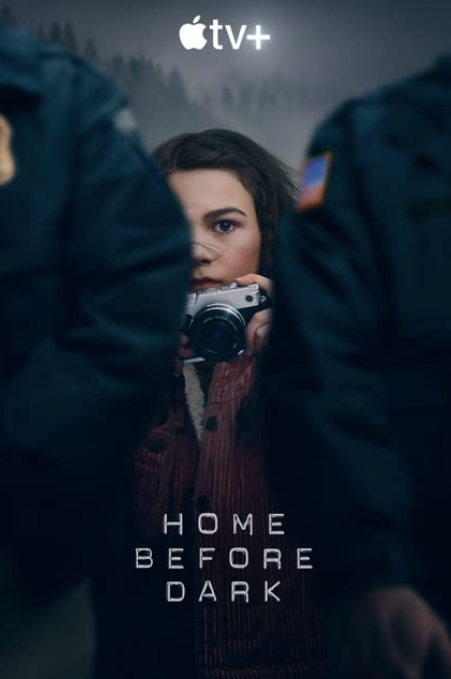
I've just seen one of the most inspiring television series in years. It made me proud to be both a writer and a professor who teaches about journalism. Home Before Dark is a 10-episode first season of a series that debuted on Apple TV+ about a year ago, a fictionalized narrative of a real 9-year old girl, Hilde Lysiak, who in real life when she was a few years older won the Junior Zenger Award for Press Freedom in 2019, aptly described on Wikipedia as "given to a journalist who fights for freedom of the press and the people's right to know."
There’s been a lot of remonstrating in the past few years about how satisfaction of partisan public opinion has replaced the investigating and reporting of truth in print, televised, and most of all social media, including by me (The Opinionization of Journalism) and in bold new books like Andrey Mir’s Postjournalism. It was therefore profoundly reassuring and a call back to truth to see Home Before Dark, all the more so because the protagonist is nine years old and a real person.
The fictionalized narrative is quite good, as well, harkening to Stranger Things as Hilde and her nine-year-old friends investigate a kidnapping that haunted and pulled apart a small West Coast town for decades. There's teenage angst and romance with her older sister Izzy, a questionable older sheriff, racism and sexism and snobism effectively mixed into a riveting mystery that Hilde and her parents and friends attempt to solve. Brooklynn Prince was fabulous and deserved an Emmy for her performance as Hilde. The whole cast was excellent but I especially also liked Kylie Rogers as Izzy, and Joelle Carter (Justified!) and Sharon Lawrence (NYPD Blue!) back on the screen.
But the paeon to truth-seeking journalism is what puts Home Before Dark over the top. Hilde's favorite movie is All The President's Men, and tells the jaded sheriff "The truth is what makes everything work right ... it’s bigger than me, it’s bigger than you, it’s bigger than all of us". He unsurprisingly, patronizingly replies, "that's adorable". But we know better, or should know better. It's no surprise that those words about the truth come from a 9-year old girl, fortunately not yet bitten by the cynicism that afflicts so many adults. We should know better, and I surely do now.
PS: Season 2 will be on Apple TV+ this June 11.
Saturday, April 17, 2021
The Nevers 1.1: Never Say Never

I wasn't going to watch The Nevers. I'd pretty much given up on superpowers on television after Heroes. On the other hand, how can you resist late 1890s London, the prime of Victorian times, the birth of The Time Machine, on the cusp of the 20th century? I couldn't, and I'm glad of it.
Or as Lord Massen says, halfway at this point between villain and defender of tradition, this is a time which hosts "the first generation accustomed to the impossible". He's right about that, but not about upholding English wording such as "the employed" over the French "employees". As Amalia True (Laura Donnelly aka Jenny Fraser of Outlander) aptly instructs Massen, the French has the advantage of easily describing a single employee or multiple employees. That's clearly true, as is True being a clearly good an intriguing character, not only because of her linguistic skills but her ability to see slightly into the future. Like I said, those late 1890s were a time of time travel, and The Nevers looks like it might mine that and many other wonders.
Some of these are already embodied in marvelous contraptions like a sleek, cool, late Victorian automobile which makes an appearance at the beginning and a gossamer flying machine which can bring back the dead or at very least the drowned which makes an appearance at the end, which come to think of it is consistent with reversing death, and promises lots of life in this series set to run on HBO in two six-episode segments.
The scenery is fetching, the accents delightful, and the acting is top notch. It was especially good to see Ann Skelly (from Red Rock!) as Penance Adair with the power to see electrical patterns, and Ben Chaplin (from Press) as Detective Frank Mundi. It's hard to beat those superpowers, but those late 19th-century detectives, on both sides of the Atlantic, had an impressive gruffness all their own.
So never say never. I'll be sticking with The Nevers and I'll see you here next week with another review.



"challenging fun" -- Entertainment Weekly
Friday, April 16, 2021
For All Mankind 2.9: Relationships

Here are the changes:: Karen told Ed that she slept with someone last week, but didn't tell him who (my take: she shouldn't have told him about last week at all, especially when he was on the verge of blasting off on a new mission). Ed couldn't quite blast off, though, with a woman he later meets at a bar (apologies for the pun -- I was sorry to see that happen, though). Molly and Wayne almost break up over Molly's insistence on going to Mexico for a quack treatment for her glaucoma, but she comes to her senses and she and Wayne hug and are staying together (good!). Tracy and Gordo are back in bunk together on the Moon (yes!) (more about the Moon in paragraph after next). And Ellen and Pam break up, more specifically Pam leaves so as not to get in the way of Ellen maybe being elected President someday, and, that great alternate reality flourish deserves a paragraph of its own.
Lee Atwater, a real historical political operator/genius (depending on how you look at it), who in our reality helped Reagan win twice and George H. W. Bush win the Presidency once, thinks Ellen should run for Congress and eventually President! Other than Atwater being a Republican, I think that's a great path For All Mankind to follow in subsequent seasons, and I very much look forward to that.
But back to the Moon, for now, in this alternate 1983 history: Of course the Soviets were bound to attack on the Moon, even as they went ahead with Apollo-Soyez, because they had to take some revenge for last week. But it was tough to see, especially after Danielle earlier quoted from Star Trek. The U. S. and the Soviets at war is a poor path to a United Federation.
And I'll be back here next week with thoughts on the season finale.
See also For All Mankind, Season 1 and Episode 2.1: Alternate Space Race Reality ... For All Mankind 2.2: The Peanut Butter Sandwich ... For All Mankind 2.3: "Guns to the Moon" ... For All Mankind 2.4: Close to Reality ... For All Mankind 2.5: Johnny and the Wrath of Kahn ... For All Mankind 2.6: Couplings ... For All Mankind 2.7: Alternate History Surges ... For All Mankind 2.8: Really Lost in Translation
Wednesday, April 14, 2021
Big Sky 1.10-11: Rocky Mountain High, Somewhat Twisted

But there's no shortage of bad guys who are evil and dangerous both inside and out. In fact, a whole new family, with Horst Kleinsasser (played by Monk's Ted Levine as the patriarch) who are up to no good and worse. The net effect is a tableau of dangers Cassie and Jenny have to face, even with Pergman out of that picture. But I have a feeling he won't be out of it too long.
The dialogue, as in the first part of the season, is snappy, sarcastic, and refreshing. And peril lurks at every turn. Cassie doesn't like a young cop, and remarks to Jenny that he's an "asshole". That's a good call -- he kidnaps Cassie at the end of the second episode, to do who knows what to and/or with her.
My guess is this cop is Legarski's successor, or connected to the same young women trafficking ring as the departed bald guy. That part of the first part of the season's story -- the full extent of the trafficking ring -- was never addressed last season. In addition to Cassie's fate, the big question now about that ring is when Pergman will reconnect with it.
All in all, Big Sky remains an attractively quirky show, with those wide Montana vistas still being so well welcome to look at as we slowly come out of our lockdown.
See also Big Sky 1.1: A Pretty Big Deal ... Big Sky 1.2: The "Goods" and the Ruined Plan ... Big Sky 1.3: "You Kidnapped the Wrong Girl" ... Big Sky 1.4: Controls on Psychos ... Big Sky 1.5: Winter Finale Indeed! ... Big Sky 1.6: "Sweet Psycho" ... Big Sky 1.7: The Montana State Trooper ... Big Sky 1.9: Crafty Ronald
New Summer Session Online Course at Fordham: "Science Fiction from Page to Screen"

Hey, I'll be teaching a brand new course at Fordham University this summer that I proposed, created, and developed over the past few months: "Science Fiction from Page to Screen". I'll be teaching the course entirely remotely, via live Zoom lectures and interviews, and group and individual email discussions, so you don't need to be in New York City to take it -- you can be anywhere in the world. And you don't need to be a student at Fordham. The course carries four undergraduate credits, and you can take the course as a visiting student from another university, or if you're a college graduate, or, if approved, if you're a high school senior (and in exceptional cases, a high school junior).
The focus of the course this summer will be Philip K. Dick's iconic award-winning 1962 novel, The Man in the High Castle, made into the Emmy-winning four-season series (2015-2019) on Amazon Prime Video, starring Rufus Sewell -- who will be be making a special Zoom appearance in our course for a live interview by me in July!
For those you who may not know me, I'm a tenured professor (former Chair of the Department of Communication and Media Studies) at Fordham University, author of seven science fiction novels (including The Plot to Save Socrates and my Locus Award winning first novel, The Silk Code) and more than forty stories, former President of the Science Fiction and Fantasy Writers of America (1998-2001), and a lifelong admirer of Philip K. Dick's work. More about me here.
I'm really looking forward to teaching this course and welcoming Rufus Sewell to Fordham!
Here is the course description:
FITV 3635 PW1 - Science Fiction From Page to Screen
Session III, June 1 - August 5, 2021
Online: TTh, 3-5 p.m.
This course examines the unique, dynamic relationship between written words published as novels and short stories and their adaptation in TV series and motion pictures, in the genre of science fiction. Issues include the reader’s expectations about screen adaptations, the challenge of visualizing the impossible in science fiction, multiple movies from a single source, and books within books as a literary and cinematic device. The course will focus on a single iconic novel adapted into a multi-season TV series.
CRN: 12993
Instructor: Levinson
4 credits
Registration details for visiting students are here. Tuition details are here.
Tuesday, April 13, 2021
Debris 1.7: Ferry Cross The Moebius

An interesting Debris 1.7 last night, that served up another example of what the debris can do, mixing horror and humanity in the now signature way that Debris does this, but not moving the ball of understanding very much forward.
Speaking of signatures, the story had a lot of nice mythological touches, beginning with the mention of the ferry, and moving on to the sweet little girl with supernatural i.e. debris-endowed powers. These interludes have a scrapbook-like quality. If only Bryan and Finola could see the whole scrapbook, rather than just these weekly pages. I feel the same way as a member of the audience.
In my review of last week's episode (1.6), I objected to the assumption of Bryan, Finola, and their superiors that says governments are the proper custodians and regulators of the debris and all their effects. No one in any country ran on a platform in which they asked the voters to give them sole or any power to represent humanity and human interests in the event that we are visited by extraterrestrials and their debris.
Someone on Twitter (maybe Scroobius Pip under a pseudonym) commented that that's what Anson Ash is saying and working against (he's played by an actor with a perfect name for a narrative like this, Scroobius Pip -- a combination, in my head at least, of Ebenezer Scrooge and moebius strip). In last night's episode, he's unceremoniously tortured by Maddox for information. And that of course brings home the point, doesn't it? What is our government doing torturing this guy?
Back in the days of 24, Jack Bauer would regularly torture anyone who had valuable information about a terrorist plot and didn't want to share it. But Ash is not quite a terrorist. He's fighting for something which might take innocent lives, for sure, but the philosophy of his cause has an angelic element. Fighting about a boat which, so far in this story on the screen, doesn't have a name.
See also Debris 1.1 Some Probability of Gems Among the Pieces ... Debris 1.2: Clones ... Debris 1.3: Trapped Out of Time ... Debris 1.4: Suspentia Belief ... Debris 1.5: Fine Tuning ... Debris 1.6: Fountain of Youth and Its Complications
Podcast: Review of Q: Into the Storm
Welcome to Light On Light Through, Episode 170, in which I review Q: Into the Storm.
Blog post review of Q: Into the Storm.
City on a Hill 2.3: Seismic Shift

I'm watching but not reviewing every episode of City on a Hill these days -- too much other writing to be done -- but episode 2.3 was impossible not to review, because [Spoilers follow ... ]
Well, the episode blurb on Showtime's page concludes with "Jimmy Ryan, meanwhile, faces problems far worse than a guilty conscience." Yes, he does. Problems from Cathy Ryan. She has every reason to hold Jimmy responsible for what happened to Jimmy's brother, her husband Frankie. And, now she has a monetary reason to shoot Jimmy to death. Which she does.
And this signals a bigger shift in this series than just the killing of one man. It signals something which was already beginning to happen last season, something which has been implicit in this narrative all along: women climbing right up there to the top of the hill with the men in this town. Women claiming power.
Now, I'm no expert on the power allocations in Boston in the 1990s. But I suspect that the ascendance of women in this narrative may be more fictional than truly historic. Someone correct me if I'm wrong. But would the real-life equivalent of Cathy Ryan have done what she did last night?
Meanwhile, it was good to see Jackie last night begin to tell at least a little of his family history to his daughter. That brought home an important point, too. As corrupt as Jackie is, he's still much better than his father and his grandfather and who knows how far back. He's working, still working. And maybe even doing some good, even if accidentally,
And, to conclude on a happy note, it's good to see DeCourcy's (great name) wife pregnant. Will this make DeCourcy a little more willing to constructively compromise on important issues? Certainly with his wife. But I'm guessing in his professional relentlessness too.
See also City on a Hill 2.1: Big Dig
See also City on a Hill: Possibilities ... City on a Hill 1.2: Politics in a Cracked Mirror ... City on a Hill 1.3: One Upping The Sopranos ... City on a Hill 1.4: Enjoyable Derivative ... City on a Hill 1.6: Tony's Mother, Mayhem, and Family ... City on a Hill 1.7: The Bodies ... City on a Hill 1.8: Personal Business and Its Accompaniment ... City on a Hill 1.9: Changes ... City on a Hill season finale: "You Ain't the Good, and I Ain't that Bad"



